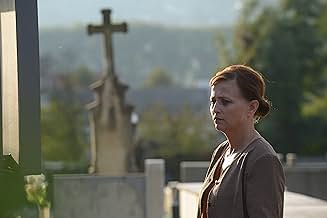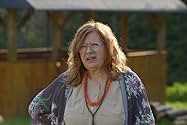Dedicated home care nurse Vlasta lives for her husband Lada, her daughter, and her patients. But then one day things change and Vlasta comes to realize that she might need some care too.Dedicated home care nurse Vlasta lives for her husband Lada, her daughter, and her patients. But then one day things change and Vlasta comes to realize that she might need some care too.Dedicated home care nurse Vlasta lives for her husband Lada, her daughter, and her patients. But then one day things change and Vlasta comes to realize that she might need some care too.
- Awards
- 6 wins & 14 nominations total
Tatiana Dyková
- Hanácková
- (as Tatiana Vilhelmová)
- Director
- Writer
- All cast & crew
- Production, box office & more at IMDbPro
Storyline
Did you know
- TriviaSimona Stasová, Libuse Safránková, Ivana Andrlová and Veronika Zilková were considered for the part of Vlasta, eventually played by Alena Mihulová.
- ConnectionsFeatured in 23. Ceský lev (2016)
Featured review
The opening shot of a deer grazing in a field is unintentionally symbolic; in an accidental, contrarily negative way, it foreshadows the quietness of the plot and the slowness of the pacing. It isn't just that the subject matter clings to the excruciating blandness and despondency of small town minutia, it's that it chooses such a tiny slice of life to investigate - one more embroiled in morose realism than cinematic verve. Nevertheless, the basis in stark reality, regardless of how depressing, possesses a certain gravity - perhaps quite powerful to anyone who can relate to the scenarios and endure the details of slight, commonplace relationships and discourse.
Voicing her concern over her rebellious daughter's ovaries and proneness to bladder infections - right in front of the young woman's boyfriend - home care nurse Vlasta (Alena Mihulova) seems perpetually distracted with other people's happiness. When she's not worrying over her own family, she's dealing with the eternal stubbornness of her disabled clients, who either ignore her advice or refuse to acknowledge why she's even present in their homes. Mr. Hlavica, for example, physically fights with her when she tries to retrieve him from a drunken slumber in a bathtub - resulting in the poor woman getting locked in the bathroom to wait for the police.
To make matters worse, Vlasta spends more money on driving and gas than she recoups with her patients, forcing her to occasionally walk home in downpours. On one day in particular, after scoffing at the notion of the city's $2 million project to build a road underpass for frogs, she finds that she's missed the last bus back to her house. Trudging through the dark and the rain, she finally catches a ride on a motorcycle, only to end up in the hospital when a stray amphibian jumps out in front of the bike. After dislodging a piece of the taillight from her stomach, the doctor informs Vlasta that she has metastases, with pancreatic cancer being the prime culprit. And the prognosis is a mere 5-7 months to live.
Many of the complementary interactions evoke pity or sadness, which helps to heighten the tragedy of Vlasta's situation. Curiously, though her financial position is discussed more than once, it doesn't actually play a significant part in her predicament. Instead, overcoming her own mental defeat - and certainly the medical professionals who have abandoned hope - becomes the greatest challenge. Some scenes are almost comical in their extreme woefulness, but there's an undeniable heart lurking under the melodramatic misfortunes.
Following a plan of pragmatic details and imagery, though riddled with nudges toward thought-provoking introspections, the characters examine spirituality, holistic medicine, homemade remedies, a rekindling of romance, preoccupations, thoughts of betrayal/blame, and numerous other forms of denial to fight the looming calamity. Mihulova's acting is the winner here, as she authentically embodies the role of a woman with a terminal illness, never once failing to appear genuine in her determination, compassion, anger, and finally, embracement of mortality. She's about as real as it gets, rotating through the stages of coping and combating with plenty of believable emotions. If it weren't for the fact that "Home Care" unfolds like a play, or a work for a medium other than film, it would be a much more potent piece. Though it's small and calm and just a bit too long for its restrained, somber content, it's very touching and entirely human. And the ending is a monumentally artistic achievement - and strikingly brave for its satisfying ambiguity.
Voicing her concern over her rebellious daughter's ovaries and proneness to bladder infections - right in front of the young woman's boyfriend - home care nurse Vlasta (Alena Mihulova) seems perpetually distracted with other people's happiness. When she's not worrying over her own family, she's dealing with the eternal stubbornness of her disabled clients, who either ignore her advice or refuse to acknowledge why she's even present in their homes. Mr. Hlavica, for example, physically fights with her when she tries to retrieve him from a drunken slumber in a bathtub - resulting in the poor woman getting locked in the bathroom to wait for the police.
To make matters worse, Vlasta spends more money on driving and gas than she recoups with her patients, forcing her to occasionally walk home in downpours. On one day in particular, after scoffing at the notion of the city's $2 million project to build a road underpass for frogs, she finds that she's missed the last bus back to her house. Trudging through the dark and the rain, she finally catches a ride on a motorcycle, only to end up in the hospital when a stray amphibian jumps out in front of the bike. After dislodging a piece of the taillight from her stomach, the doctor informs Vlasta that she has metastases, with pancreatic cancer being the prime culprit. And the prognosis is a mere 5-7 months to live.
Many of the complementary interactions evoke pity or sadness, which helps to heighten the tragedy of Vlasta's situation. Curiously, though her financial position is discussed more than once, it doesn't actually play a significant part in her predicament. Instead, overcoming her own mental defeat - and certainly the medical professionals who have abandoned hope - becomes the greatest challenge. Some scenes are almost comical in their extreme woefulness, but there's an undeniable heart lurking under the melodramatic misfortunes.
Following a plan of pragmatic details and imagery, though riddled with nudges toward thought-provoking introspections, the characters examine spirituality, holistic medicine, homemade remedies, a rekindling of romance, preoccupations, thoughts of betrayal/blame, and numerous other forms of denial to fight the looming calamity. Mihulova's acting is the winner here, as she authentically embodies the role of a woman with a terminal illness, never once failing to appear genuine in her determination, compassion, anger, and finally, embracement of mortality. She's about as real as it gets, rotating through the stages of coping and combating with plenty of believable emotions. If it weren't for the fact that "Home Care" unfolds like a play, or a work for a medium other than film, it would be a much more potent piece. Though it's small and calm and just a bit too long for its restrained, somber content, it's very touching and entirely human. And the ending is a monumentally artistic achievement - and strikingly brave for its satisfying ambiguity.
- The Massie Twins
- GoneWithTheTwins_com
- Apr 8, 2016
- Permalink
Details
- Release date
- Countries of origin
- Official sites
- Languages
- Also known as
- Negovalka
- Filming locations
- Production companies
- See more company credits at IMDbPro
Box office
- Gross worldwide
- $399,790
- Runtime1 hour 32 minutes
- Color
Contribute to this page
Suggest an edit or add missing content














